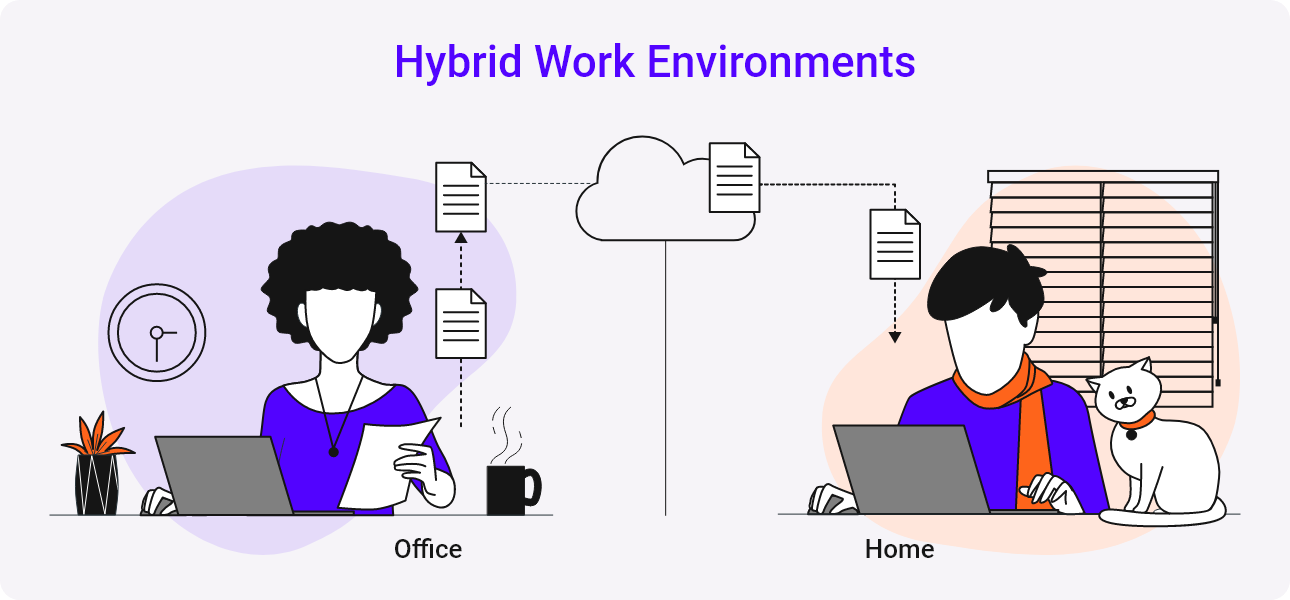Hybrid work – Are you ready to take on this new big disruption?

Hybrid work, Work from home, Remote workplace
Hybrid work – Are you ready to take on this new big disruption?
By Newwe - Oct 12, 2022
Businesses around the world are adjusting their workplace practices to embrace the paradigm shift brought about by the COVID-19 pandemic – hybrid work. Hybrid work means that employee's work a portion of their time in the office and the remainder of their time working remotely.
According to a recent BridgenTech survey, hybrid work is here for good.
“Six out of ten employee's prefer hybrid work rather than office work.”
“Twenty six percent of employee's prefer three days a week, seventeen percent four days a week, nine percent two days a week and eleven percent one day a week.”
Three days a week at the office seems to be the most popular flexible way people like to go. And the flexible work model has become more attractive to the current working population. As this model blends both in-person and remote flexibility, allowing people to adapt their work routine to best suit their lifestyle. The benefits of hybrid work model include reducing operating costs, improving work-life balance, redefining collaboration, increasing productivity and efficiency, and more.
Despite the expectation that flexible work schedules are being incorporated, most businesses still need to iron out the potential obstacles and challenges of sustaining the hybrid work model. There are many questions that organizations need to answer before transitioning their future of work, here are a few of many:
-
What are the nuances and pitfalls of hybrid remote control?
-
Is there a need for defining specific-hybrid roles?
-
What tools or technologies are needed to transition to a hybrid work model?
-
How is it possible to keep track of employee's employment status and working hours?
By answering these questions, you will get 50% of the work. There is no doubt that the pandemic has pushed most businesses to make a smooth transition to the hybrid work model. But what can we do to make it work better? Let's talk about some potential challenges related to hybrid work disruption and how to easily address them.
Risk to corporate culture
With the hybrid work model, time spent in the workplace by employee's would be lower than the original office hours. Although some employee's are anxious to see the return to office plan, some are disappointed with the decision. Companies may also experience trouble with reinforcing constant communications between remote employee's. It is important to overcome barriers such as lack of face-to-face communication and inconsistent feedback while making sure employee's are valued. With constant communication platforms like Newwe, it's easy to fight such a challenge that could have a negative impact on the corporate culture.
The ‘Silo Effect’ among workforces
Remote work makes organizations more siloed. According to Forbes, 90% of GenZ employee's prefer human connections when asked about their at-work communication – bringing a fresh perspective to the world of work. But this may also result in too many attitudinal differences between other generations if they have an opportunity to work together. There would be disengagement across the teams as a result of less spontaneous communication or forced communication where they only interact with each other for their projects. How can this be prevented? Put in place an effective communication system that facilitates direct communication with their supervisors and provides transparency in assessing performance.
Unconscious bias
Fear of on-site favoritism, especially when employee's get more advancement opportunities than employee's who don’t. Despite many studies proving that hybrid work promotes increased employee productivity and utilization, employee's who are working out of the office, or working from home can experience a negative impact on this perception. To overcome this challenge, it’s advisable for organizations to track employee's that are given career-advancing assignments, keep metrics handy to ensure everyone has equal access to their work and growth opportunities, and train managers to avoid unconscious bias toward in-office employee's. Check out how Newwe can reduce such unconscious bias in measuring the performance of employee's with its advanced machine learning techniques and in-built NLP to identify the tone and sentiment of employee's.
Technology – the great enabler to great inhibitor
Many businesses have already made significant investments in tools and technology that support remote workers. But, with the peak of inflated expectations from employee's over the hybrid work model – wanting luxury, hospitality-like experiences with perks while businesses also want to maximize employee's in-person interactions. As a result, technology has gone from being a great enabler to a great inhibitor. Companies are investing in multiple apps for every single need of employee's or business requirements. Concerns over tech readiness are clearly seen and businesses that are investing in technology for every foreseeable need are only burning holes in their pockets. So, invest in key applications that are of utmost importance to run your day-to-day business operations. Based on the hybrid listening and how your workforce is utilizing this technology, decide to invest in new applications or upgrade existing applications that are needed.
Conclusion
There is no doubt that the workplace has been affected by the global virus pandemic. It is not easy to make sure that hybrid and off-site workers are always productive and happy with their jobs. But it can be done! This is an excellent opportunity for companies to shift from efficient workplaces to effective workplaces that include resiliency and sustainability at their peak. Companies should implement strategies aimed at streamlining their hybrid work arrangements. Discover lots of informative tips on how to better manage hybrid teams - Stay tuned!